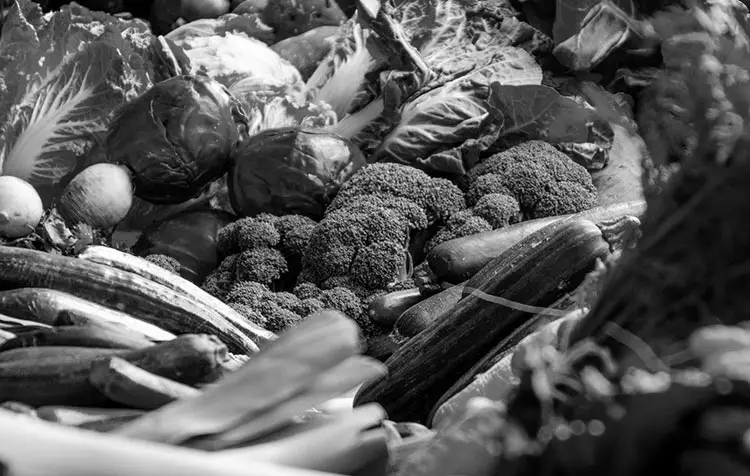Looking for facts, figures and statistics about food waste in Germany and the world? Then you've come to the right place! The World hunger is one of the biggest social problems of our time. One decisive factor: the way food is handled in Western cultures. A look at the facts shows that we live in a rather disrespectful Disposable society live, which no longer sees the value of food because of its constant availability.
In this article I would like to give you all the meaningful facts, figures and statistics about discarded food. This way, you can give yourself and other people a clear picture of how massive food waste really is in the world and especially in countries like Germany. Let's go!
Here is in advance already a small Table of contents for you:
Notice: If you use any of the food waste statistics from this post, please credit the following source. Thank you for your support!
https://www.careelite.de/lebensmittelverschwendung-statistiken-zahlen-faktenGeneral food waste statistics
We get a good start with the most important, general facts surrounding the issue of food waste. Here are some numbers that should get everyone thinking:
- Worldwide: Around 1.3 billion tons of the world's food ends up in the trash every year.₁
- Germany: In Germany alone, around 12 million tons of food are wasted every year.₂
- Per capita: On average, we Germans throw around 75 kilograms of our food in the trash can!₃
- Private households: Around 6.7 million tons of still edible food are thrown away in German households. Figuratively speaking, that's about two fully packed shopping carts with a commodity value of 234 euros per person.₄
- One in eight foods: In German households, around one in eight items of food is thrown away - even though no one actually wants to waste food.₅
- Production to consumption: In fact, around one third of all food produced worldwide is lost on its way from the field to the plate.₆
Facts & figures on the generation of food waste in Germany
A report by the Johann Heinrich von Thünen Institute₇ reveals which areas are particularly responsible for the shocking figures on food waste in Germany:
- Private households: About 52 percent of all food waste is generated in private households.
- Agriculture: Primary production accounts for about 12 percent (1.4 million tons in total).
- Processing: In the processing of food alone, about 18 percent - and thus about 2.2 million metric tons - of food is lost.
- Retail: Retailers generate 4 percent (0.5 million tons) of all food waste in Germany.
- Out-of-home consumption: About 14 percent (1.7 million tons) of food waste is attributable to ToGo consumption.
The institute also determined that, in fact, about half of all food waste could be avoided.
Food that is frequently thrown away in private households
Which foods do we Germans throw away particularly often? A survey by the BMEL₈ has shown which foods make a decisive contribution to food waste in Germany:
- Fruits and vegetables: 34 percent
- Home Cooked: 16 percent
- Bread & pastries: 14 percent
- Drinks: 11 percent
- Dairy products: 9 percent
- Finished products: 7 percent
- Fish and meat: 4 percent
These food waste statistics make it clear where we find a particularly high potential for improvement.
Food waste statistics from retail
Which foods often end up in the garbage can at retail? A study by the German Federal Ministry of Food and Agriculture₉ answers this question quite precisely:
- Total: 696,480 tons of food waste were thrown away in total in German food retailing in 2015.
- Fruits and vegetables: 328,250 tons are accounted for are fruit and vegetables
- Bread and baked goods: 206,400 tons
- Dairy products: 60,260 tons of which are
- Meat and sausage products: 53,310 tons of which are
- Containers: Around 81 percent of people in Germany think that it should be allowed to save food that is still edible from the trash can.₁₀
Facts and figures on the consequences of food waste
All of the above statistics should inspire reflection. But some of the facts also raise moral questions, as food waste occurs at the expense of the planet, animals, or even other people. What do I mean by that? See for yourself - here are some facts from a study by the Federal Environment Agency₁₁ and other organizations:
- Greenhouse gases: Every year, food waste generates more than 38 million metric tons of greenhouse gases, which contribute significantly to the climate change Contribute.
- Land consumption: About 43,000 square kilometers of agricultural land are tilled, only to have the food thrown away.
- Water consumption: About 216 million cubic meters of water are consumed in vain. This contributes decisively to the Water shortage at.
- Animal Welfare: According to the Heinrich Böll Foundation, more than four kilograms of meat and sausage are wasted per capita in Germany every year. Converted to slaughter animals, that's 230,000 cattle, 1,800,000 ducks, 2,700,000 turkeys, 4,100,000 pigs and 45,000,000 chickens carelessly thrown into the garbage can.₁₂
Beyond the environmental, health and ethical issues, however, food waste also impacts the economy. The direct economic impact of waste on food producers is estimated at around $750 billion per year.₁₃
Notice: Particularly large quantities of natural resources are wasted when animal food is thrown away! That is one of the reasons, why i live vegan.
Scientific studies on food waste
Here are three studies that were extremely helpful in my research on food waste statistics:
- Thünen Report 71 (2015): Food waste in Germany - Baseline 2015
- WWF Germany (2015): The big throw away
- FAO (2013): Food waste harms climate, water, land and biodiversity
Feel free to check them out if you're looking for even more specific facts and figures about food waste.
Use facts and figures to create awareness of the value of food
We throw about 1.3 billion tons of food in the garbage can, while at the same time about 700 million people do not have enough to eat.₁₄ Isn't that crazy? We have to do something.
Everyone can learn to use their own Reduce food waste and thus at the same time the personal ecological footprint to improve. Oh and by the way, you can through this sustainable behavior also save money! The food waste statistics should give you the decisive motivation for a more conscious use of food.
Do you have any questions or suggestions about the facts and figures on food waste? Then just write me a comment!
Stay sustainable,

PS: Want to do more to fight global hunger? Then learn now how you can make sure in your everyday life that the World hunger stopped will!
Notice: If you use any of the food waste statistics from this post, please credit the following source. Thank you for your support!
https://www.careelite.de/lebensmittelverschwendung-statistiken-zahlen-faktenReferences:
₁,₂,₃,₁₄ Deutsche Welthungerhilfe e.V.: Put an end to food waste (as of 08.04.2021), https://t1p.de/eiqy. [03.05.2021].
₄,₅,₆,₁₁Federal Environment Agency: Against waste (as of April 30, 2020), https://www.umweltbundesamt.de/themen/wider-die-verschwendung. [03.05.2021].
₇ T. Schmidt, F. Schneider, D. Leverenz, G. Hafner: Food Waste in Germany, https://www.thuenen.de/media/publikationen/thuenen-report/Thuenen_Report_71.pdf. [03.05.2021].
₈,₁₀ R. Bocksch: Food Waste in Germany (as of Aug. 21, 2020), https://t1p.de/zl5u. [03.05.2021].
₉ Statista GmbH; BMEL: Food waste from food retailing in Germany in 2015 (as of 14.09.2020), https://t1p.de/ocf0. [03.05.2021].
₁₂ S. Lemmerz: Food Waste - Wasting Lives, https://www.provieh.de/lebensmittelverschwendung-verschwendung-von-leben. [03.05.2021].
₁₃ Slow Food Deutschland e.V.: FAO study, https://www.slowfood.de/aktuelles/2013/fao_studie. [03.05.2021].






